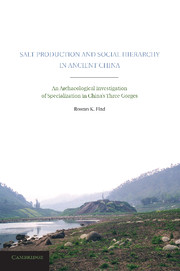 Salt Production and Social Hierarchy in Ancient China
Salt Production and Social Hierarchy in Ancient China Book contents
- Frontmatter
- Contents
- List of Figures and Tables
- Acknowledgments
- Prologue
- 1 Introduction
- 2 Production and Specialization in Complex Societies
- 3 Ancient Salt Production in Sichuan
- 4 The Zhongba Site
- 5 Ceramic Evidence
- 6 Parameters of Production According to Ceramics
- 7 Features and Spatiality
- 8 Animal Remains and Divination
- 9 Conclusions and Implications
- Epilogue
- Appendix A Chinese and Japanese Term List
- Appendix B The (t) Value and Average Thickness for Each Level Excavated in DT0202
- Appendix C Calculating the Scale of Production Using Briquetage from DT0202
- Appendix D Taxon List for Specimens Recovered from DT0202 with Number of Identified Specimens and Minimum Number of Individual Count by Phase and Subphase
- Notes
- Bibliography
- Index
Epilogue
Published online by Cambridge University Press: 07 September 2011
- Frontmatter
- Contents
- List of Figures and Tables
- Acknowledgments
- Prologue
- 1 Introduction
- 2 Production and Specialization in Complex Societies
- 3 Ancient Salt Production in Sichuan
- 4 The Zhongba Site
- 5 Ceramic Evidence
- 6 Parameters of Production According to Ceramics
- 7 Features and Spatiality
- 8 Animal Remains and Divination
- 9 Conclusions and Implications
- Epilogue
- Appendix A Chinese and Japanese Term List
- Appendix B The (t) Value and Average Thickness for Each Level Excavated in DT0202
- Appendix C Calculating the Scale of Production Using Briquetage from DT0202
- Appendix D Taxon List for Specimens Recovered from DT0202 with Number of Identified Specimens and Minimum Number of Individual Count by Phase and Subphase
- Notes
- Bibliography
- Index
Summary
Pouring of the concrete in the first part of the Three Gorges Dam was completed in 2002, and in early June 2003, the reservoir was filled to its initial level at 135 m above sea level and the first electricity generators were turned on. The dam body was completed in early 2006, and the remaining portions of the coffer dam that had been built to allow construction were destroyed in June of that year. The water level behind the dam gradually increased up to a maximum elevation of 175 m. Zhongba was among the thousands of villages, towns, and historic sites flooded as this reservoir filled up.
After our excavation work was completed at Zhongba, many of the analyses that have been detailed in this book were conducted in either the Cultural Relics Bureau in the Zhong County seat or in Beijing, to which some of the material was transported for analysis. In 2003, we were back in Zhong County for a short time, finishing our analysis of ceramics and conducting salt-production experiments at the Cultural Relics Bureau, which was located in the Baigongci temple on the outskirts of the seat of Zhong County. The village of Youxi was demolished over the course of 2001—2002, and villagers moved away, some into the city of Zhong County seat, some uphill, and others to more distant regions.
I last visited Zhong County and Zhongba in 2004, together with my colleagues Pochan Chen and Lothar von Falkenhausen:
July 4, 2004. Lots has changed in Zhong Xian since we were last here. The road past Baigongci, which I walked every day last time I was in town, has now been finished, and has become the main entry route to the city. This is one of many things that are completely different about the city’s layout.
- Type
- Chapter
- Information
- Salt Production and Social Hierarchy in Ancient ChinaAn Archaeological Investigation of Specialization in China's Three Gorges, pp. 231 - 232Publisher: Cambridge University PressPrint publication year: 2011


